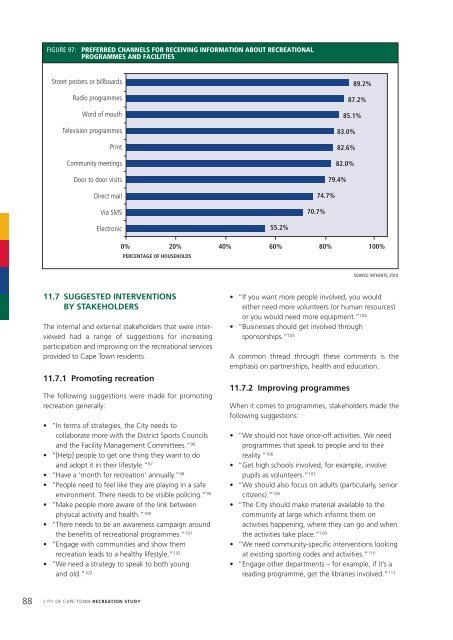FIGURE 97:PREFERRED CHANNELS FOR RECEIVING INFORMATION ABOUT RECREATIONALPROGRAMMES AND FACILITIESStreet posters or billboardsRadio programmesWord of mouthTelevision programmesPrintCommunity meetingsDoor to door visitsDirect mailVia SMS89.2%87.2%85.1%83.0%82.6%82.0%79.4%74.7%70.7%Electronic55.2%0% 20% 40% 60% 80% 100%PERCENTAGE OF HOUSEHOLDSSOURCE: MTHENTE, 201011.7 SUGGESTED INTERVENTIONSBY STAKEHOLDERSThe internal and external stakeholders that were interviewedhad a range of suggestions for increasingparticipation and improving on the recreational servicesprovided to Cape Town residents.11.7.1 Promoting recreationThe following suggestions were made for promotingrecreation generally:• “In terms of strategies, the City needs tocollaborate more with the District Sports Councilsand the Facility Management Committees.” 96• “[Help] people to get one thing they want to doand adopt it in their lifestyle.” 97• “Have a ‘month for recreation’ annually.” 98• “People need to feel like they are playing in a safeenvironment. There needs to be visible policing.” 99• “Make people more aware of the link betweenphysical activity and health.” 100• “There needs to be an awareness campaign aroundthe benefits of recreational programmes.” 101• “Engage with communities and show themrecreation leads to a healthy lifestyle.” 102• “We need a strategy to speak to both youngand old.” 103• “If you want more people involved, you wouldeither need more volunteers (or human resources)or you would need more equipment.” 104• “Businesses should get involved throughsponsorships.” 105A common thread through these comments is theemphasis on partnerships, health and education.11.7.2 Improving programmesWhen it comes to programmes, stakeholders made thefollowing suggestions:• “We should not have once-off activities. We needprogrammes that speak to people and to theirreality.” 106• “Get high schools involved, for example, involvepupils as volunteers.” 107• “We should also focus on adults (particularly, seniorcitizens).” 108• “The City should make material available to thecommunity at large which informs them onactivities happening, where they can go and whenthe activities take place.” 109• “We need community-specific interventions lookingat existing sporting codes and activities.” 110• “Engage other departments – for example, if it’s areading programme, get the libraries involved.” 11188 CITY OF CAPE TOWN RECREATION STUDY
The key themes running through these comments aresustainability, community and volunteer involvementand community-specific interventions, utilising partnershipswith other departments.11.7.3 Improving facilitiesStakeholders made several comments with regards toimproving facilities, including the following:• “Facilities should be used to generate income –which goes back to the community.” 112• “We must be able to compare our facilitiesinternationally.” 113• “Make an effort to get kids and women back intoour community centres.” 114• “We have to make sure that wherever we buildhouses, through the integrated humansettlements, space should be made for fields.” 115Overall, stakeholders were concerned that facilities be integratedwithin communities, used optimally for all targetaudiences and maintained according to high standards.11.7.4 Empowering recreation staffThe following comments capture the key suggestionsmade by stakeholders with regard to empowering recreationstaff:• “The training of city officials should include:implementation of activities; how to engagecommunities and a shift in mindset – that we areserving the community.” 116• “We need to get to know the community needsand tackle social issues through implementingdevelopmental programmes... We need to speakto the community.” 117The main emphasis in these and other commentsregarding recreation staff is on the need for training andcommunity engagement.11.8 SUMMARY OF CHAPTER 11To summarise the findings discussed in Chapter 11:• The majority of residents feel that the best ways toencourage participation among adults and childrenare to have programmes for all ages, make the areasafer, introduce programmes the community wants,improve the conduction of facilities and makeprogrammes and facilities more accessible.• Overall, the facilities most sought after by residentsare: multi-use game areas, swimming pools,community halls, sports fields and parks. Thesewere ranked slightly differently depending on thedemographic group.• The top five preferred programmes are: health andfitness, Come and Play, arts and crafts, games forseniors and music. These varied according todemographic groups, with some groups alsoincluding soccer, cricket and dance in their top five.• Across all demographic groups, the majority ofresidents prefer afternoon for recreationprogrammes.• Residents also prefer programmes that contribute tophysical and mental fitness, provide enjoyment andrelaxation, involve other communities, involve massinvolvement in their community and utilise formalcodes and rules.• The preferred communication channels for receivinginformation about sport and recreation are: streetposters and billboards, radio programmes, word ofmouth, television programmes and print media.• A range of suggestions were made by stakeholdersregarding ways to promote recreation,improvements to programmes, improvements tofacilities and ways to empower recreation staff.FIGURE 98: SEA POINT POOL (SOURCE: SRA)FIGURE 99: RECREATION FESTIVAL IN PRINCESS VLEI(SOURCE: SRA)FIGURE 100: KHULANI BEACH SOCCER, SPORTINGCHANCE, 2008 (SOURCE: SRA)RESEARCH REPORT JANUARY 201189


